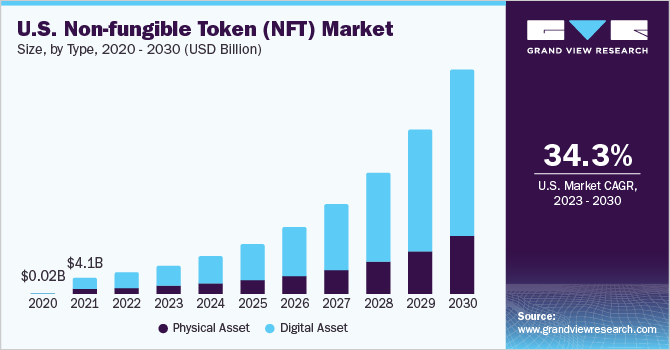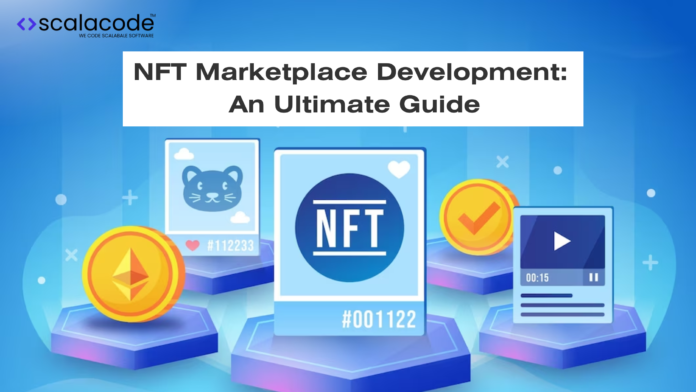Online marketplaces for digital collectibles have indeed become increasingly popular. These platforms allow individuals to buy and sell various digital assets using digital currencies such as Bitcoin.
So, if you are thinking of entering this space, you need to have your own NFT marketplace first. Apps like OpenSea, Rarible, and others are already there.
But how to start with this? What things are important to consider when starting your own NFT marketplace?
First and foremost, reach out to a top NFT development company. Why? Because having tech professionals who already know the ins and outs of this domain makes it easy for you to handle all technical aspects. With their expertise, you can navigate the complex world of NFTs more smoothly.
Now, let’s dive into the basics.
What is an NFT marketplace?
Befoore we learn about the NFT marketplace, let’s know what NFT is.
An NFT, or Non-Fungible Token, is a unique digital asset that represents ownership of a specific item or piece of content. Unlike traditional cryptocurrencies like Bitcoin, NFTs are indivisible and cannot be exchanged on a one-to-one basis. They are often used for digital collectibles, art, music, and more.
Moreover, An NFT marketplace is essentially a digital platform where individuals can engage in various activities related to Non-Fungible Tokens. These platforms serve as multifunctional spaces for NFT enthusiasts, offering several key features:
- Buying and Selling
- Storage and Display
- Transaction Facilitation
- Payment in Cryptocurrency or Fiat Money
- Minting NFTs
Why NFT Marketplace Development?
According to a report on the NFT market by Grand View Research, the market is expected to grow significantly and reach over $210 billion by the end of 2030. This huge growth is noteworthy considering the current market valuation stands at $20.44 billion.

Steps For NFT Marketplace Development
Starting your own NFT marketplace can be an exciting venture in today’s digital age. To make it unique and successful, you should follow some key steps and considerations.
Let’s break it down, shall we?
Step 1. Begin with a Vision:
So, you’ve got this brilliant idea to start your own NFT marketplace? Great! Your first step is to brainstorm your vision and set clear goals. What do you want to achieve? What will be your business model?
There are different business model you can chose from, such as-
- Commission-based Model
- Subscription-based Model
- Freemium Model
- Hybrid Model
Moreover, in the world of NFT marketplaces, there are two main approaches you can choose from when it comes to development:
- Creating It From Scratch:
If you opt to create your NFT marketplace from scratch, be prepared for a more extensive investment in terms of both time and money. This approach involves starting with a blank canvas and building your platform piece by piece.
- Picking A White-Label NFT Marketplace:
On the other hand, choosing a white-label NFT marketplace offers a more efficient and time-saving option. A white-label NFT marketplace is a pre-built solution equipped with essential features and blockchain integration.
Step 2. Research the Market:
Before diving into NFT marketplace development, take some time to research the market thoroughly.
What are the existing platforms like OpenSea and Rarible doing well? How can you differentiate yourself?
Besides, it is also important to understand their type. There are two main type of NFT marketplaces,
- Open Marketplace
An open marketplace is a type of NFT marketplace that invites everyone to get involved in buying, selling, and trading NFTs. There are typically no hoops to jump through to join and take part in the marketplace.
Users can freely list their NFTs for sale or trade. Open marketplaces offer a vast array of NFT collections, creating a broad and inclusive trading environment that welcomes all.
- Closed Marketplace
On the flip side, a closed marketplace operates with specific restrictions and boundaries. To join and participate, users may need to undergo a vetting process or secure special permission.
Closed marketplaces might also limit access, such as being exclusively available to a specific group of users or requiring membership or invitation-only entry.
These platforms often feature a curated selection of NFT collections, and involvement tends to be more controlled or regulated compared to open marketplaces.
Step 3. Hire NFT Development Experts:
Moving further, here’s the critical part – finding the right NFT marketplace development company.
They are really important as they will transform your vision into reality. You need someone who knows the ropes inside out. So, keep your eyes open and try to find a company that can work on your NFT project.
Step 4. Plan and Design:
Work closely with your development team to plan and design your marketplace.
- What should it look like?
- Which element should be placed at which place?
- How will users navigate through it?
- What features will make it stand out?
As said, first impressions are crucial. Therefore, the design of your NFT marketplace should be on point.
Step 5. Smart Contract Development:
Your marketplace will need smart contracts to manage NFT ownership and transactions securely. Make sure these are rock solid.
Step 6. Build, Test, and Iterate:
With your development team in action, your marketplace will start taking shape. Regularly test it and make improvements. This isn’t a one-time thing; it’s an ongoing process.
Step 7. Launch with a Bang:
When everything’s ready, it’s time for the big moment. Launch your NFT marketplace with a grand unveiling. Get the word out and create a buzz!
Step 8. Market and Promote:
To keep your marketplace thriving, consistent marketing and promotion are key. Use social media, influencers, and partnerships to expand your reach.
Step 10. Adapt and Innovate:
Remember, the NFT space is ever-evolving. Keep an eye on trends and user feedback. Adapt and innovate to stay relevant.
Other Important Factors To Keep In Consideration While Developing NFT Marketplaces
- Stay Compliant:
Compliance with legal regulations is a must. Consult with legal experts to ensure your NFT marketplace adheres to all necessary laws.
- Keep the Community Engaged:
Foster a sense of community among your users. Organize events, discussions, and contests to keep them engaged and excited.
- Secure Transactions:
Prioritize security at every step. Use encryption, two-factor authentication, and regular audits to protect your users’ assets.
- Scale Up:
As your NFT marketplace grows, plan for scalability. Ensure that your infrastructure can handle increased traffic and transactions.
- Future-Proofing:
Anticipate future trends in NFTs and blockchain technology. Stay ahead of the curve to remain competitive.
How Much Will It Cost To Develop An NFT Marketplace?
Well, NFT marketplace development cost is influenced by various factors, and it can be challenging to come up with an exact figure upfront.
Moreover, you can get an accurate cost estimate while having a discussion about your specific requirements with an NFT marketplace development company. They can provide a quote based on your project’s scope.
Furthermore, here’s a list of some key elements that affect the development cost of your NFT marketplace platform or app:
- Choice of Blockchain Technology:
Blockchain technology, such as Ethereum, Binance Smart Chain, etc have different pricing structures. Thus, the one you pick for your project will determine the cost.
- Digital Wallet Support:
Integrating support for various digital wallets can increase development costs. Compatibility with popular wallets like MetaMask, Trust Wallet, or custom wallet solutions will affect expenses.
- Features Incorporation:
The complexity and number of features you want in your NFT marketplace play a vital role in cost determination. Features like auctions, bidding, instant buying, royalties, and social integration will add to development expenses.
- White-Label vs. Custom Development:
Choosing a white-label NFT marketplace solution can be cost-effective and faster, while custom development offers more flexibility but can be more expensive due to the need for unique coding and design.
- Development Team Location:
Rates for NFT developers vary by location. For example, the hourly rate of developers in India is $25-70. However, developers who are staying in the USA may ask you to pay $50-100 per hour. So hiring a team from a region with lower labour costs may reduce expenses.
Wrap Up
So, here we end our discussion. This quick guide on NFT marketplace development might have given you an idea about the entire development process. Remember, it’s a dynamic space, so stay agile and ready to adapt. With dedication and the right team, your NFT marketplace can become a thriving digital collectibles hub.
Author bio:- I am Emma Hazel mobile app developer with several years of experience in the field and I’m working with one of the fastest-growing mobile app development company, ScalaCode. We are providing mobile app development services to convert your ideas into reality. We use the latest development tools and technologies to create apps that are fast, responsive, and user-friendly, and we are committed to delivering projects on time and within budget.

